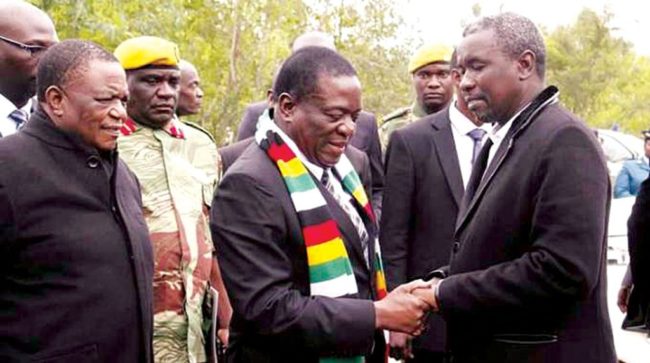Exposed: Tagwire’s off-budget funding of military, money laundering

President Emmerson Mnangagwa shakes hands with Kudakwashe Tagwirei while Vice President Constantino Chiwenga looks on
HARARE – Set well back from the public road at the end of a long driveway lined with palm trees is an extravagant new mansion being built by Kudakwashe Tagwirei, a Zimbabwean businessman and presidential adviser accused of corruption.
Much like this Harare residence, Tagwirei’s business empire of more than 40 companies has mostly been hidden from the public eye. By analysing hundreds of company documents, court filings, and communications, the United States-based investigations unit The Sentry has uncovered information that shows how Tagwirei used complex corporate structures to build and hide his wealth, potentially benefiting from preferential government treatment along the way.
Tagwirei has invested in gold, nickel, platinum, and chrome mines by hiding behind South African businesspeople and offshore structures in Mauritius and the Cayman Islands and by using lawyers and financiers who are seemingly happy to turn a blind eye to accusations of cronyism and corruption.
The documents uncovered also show how Tagwirei has used similar networks to hide his financial interests in Zimbabwe’s new public-private partnership mining company, Kuvimba Mining House, with Zimbabwe’s finance ministry reportedly collaborating to deflect public scrutiny from these arrangements.
In 2019, Tagwirei paid millions of dollars to a Zimbabwean military-owned company so that Landela Mining Ventures, a company he controlled, could purchase 50 percent of Great Dyke Investments (GDI), a platinum mine worth hundreds of millions and run as a joint venture with a Russian firm. The payment raises fears about off-budget financing of Zimbabwe’s abusive and partisan military.
An examination of Tagwirei’s business track record reveals a pattern of accusations of privileged access and special treatment, some of which may warrant further investigation by regulators and law enforcement.
On January 27, 2021, over a year after Landela Mining Ventures had bought half of the platinum mine, Zimbabwe granted GDI a five-year corporate income tax holiday and exempted its shareholders resident in Zimbabwe from resident shareholders’ taxes on GDI dividends—retroactively applied to January 1, 2020.
Auditors investigating corruption red flags in a 2016 US$630 million diesel-powered power plant contract found that the Office of the President had improperly interfered with the procurement process, ordering officials to evaluate Tagwirei’s sole bid outside the standard process.
Other decisions worthy of further investigation include allegations of preferential access to hard currency and the appointment of Tagwirei’s oil trading company, without a tendering process, to run a $1 billion dollar agriculture project.8In addition to alleged business dealings with the Zimbabwean military, Tagwirei appears to have the ability to contact senior civilian officials in Zimbabwe at short notice, particularly at the Reserve Bank of Zimbabwe (RBZ).
Such high-level access, together with the pattern of previous decisions, raises the possibility of state capture, when the public realm—particularly regulatory, legal, and public policy decision-making—has been influenced to benefit private interests. Senior officials at Tagwirei’s companies have denied state capture.
The operations of Tagwirei’s network are emblematic of larger structural problems in Zimbabwe. A select group of politicians, the military, and businesspeople dominate government decision-making with little over-sight or scrutiny. Key information about public finances remains shrouded in secrecy.
Justyna Gudzowska, Director of Illicit Finance Policy at The Sentry, said: “This report presents a textbook case of just how far shady businessmen will go to evade financial institutions’ due diligence requirements—utilising complex ownership structures, nominee directorships, Cayman Islands investment funds, and trusts.
“Global banks cannot assume that they are safe from such manipulations just because they have a limited footprint in Zimbabwe. Enablers can be located in any jurisdiction, and financial institutions should be on continuous alert for possible money laundering and suspicious activity.”
Said J.R. Mailey, director of investigations at The Sentry: “The story of the Tagwirei network shows how cases of grand corruption are virtually never limited to misconduct in one jurisdiction. A host of business partners, shell companies, banks, and service providers from across the globe helped facilitate and conceal aspects of Tagwirei’s activities throughout his rise. Accordingly, addressing this challenge will require a multinational response.”
John Prendergast, the co-founder of The Sentry which was set up to follow the dirty money connected to African war criminals and transnational war profiteers said the Tagwirei findings shined a light on “larger, structural problems in Zimbabwe.”
“A select group of politicians, the military, and businesspeople dominate government decision-making with little oversight or scrutiny. An environment of impunity prevails for both human rights violations and corruption. Left unaddressed, these dynamics will likely become further entrenched,” Prendergast said.
The Sentry Recommended:
Financial institutions should conduct enhanced customer due diligence on transactions involving natural resources and government procurement in Zimbabwe—especially when transactions involve the Tagwirei network.
Law enforcement and regulatory authorities in relevant jurisdictions should dig deeper into Tagwirei’s network. South African and Mauritian authorities, in particular, should investigate those connected to Tagwirei’s network, liaising with the United States.
The United States, European Union countries, and the United Kingdom should consider issuing advisories on the risks of doing business with the Zimbabwean mining sector, highlighting the risks of sanctions evasion, money laundering, and corruption.
Companies operating in Zimbabwe’s mining sector should conduct ongoing due diligence consistent with the United Nations Guiding Principles and the Organisation for Economic Co-operation and Development’s due diligence guidance for responsible mineral supply chains, with particular attention paid to identifying and mitigating risks associated with corruption and direct or indirect support for the Zimbabwean military forces.
Within Zimbabwe, authorities should conduct a retrospective review of the mining sector leading to reforms including beneficial ownership transparency, open contracting and tendering process-es, project-level revenue reporting, and the implementation of anti-money laundering (AML) and anti-corruption processes. Zimbabwe should also create a publicly accessible corporate registry adherent with Financial Action Task Force (FATF) guidance -ZIMLIVE




